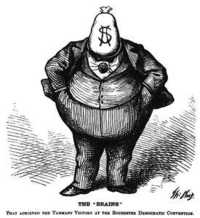
It’s a lie that makes my blood boil every time I read it. (This cartoon, by Thomas Nast, is over 110 years old.)
The lie is that the U.S. telecommunications market is competitive, even hyper-competitive.
That lie was told again this week, by the Walt Disney Internet Group, when it announced its MVNO, a re-sale agreement with Sprint, would be closing. (The idiot in charge was engaging in some serious ass-covering.)
This followed similar announcements by Amp’D Mobile and by ESPN, another Disney unit. The only successful MVNO in the U.S. is Virgin Mobile, which is trying to go public in order to pay down its bills.
The plain fact is that the U.S. communications market, wired and wireless, phone, cable and Internet, is an oligopoly with very few participants, and that U.S. consumers have either few or no choices.

Look at your own situation. How many choices do you have for phone
service? Maybe two. How about TV service? Maybe two. How about wireless
service? Maybe as many as four, but if you look at maps showing where
service is strong and weak, chances are fewer.
This is what our forefathers, over 100 years ago, would call a Trust.
It’s a shared monopoly in which the seller can charge what it wants,
under any conditions it wants, paying as little attention to customer
needs as it wants, and customers have no choice.
What are the most hated industries in the country today? Phone. Cable.
Internet. Where is the worst customer service? And what is the only "competitive" offering being made in any
of those industries? That’s right, the "triple play," an attempt to get
you to buy all these things from one company, to make you completely
dependent for all these services on one firm.
Why aren’t you reading about this in your newspaper, or magazine, or on TV? All those industries have become dependent on the advertising of the trusts. Count the number of ads they’re running — it’s all they spend money on. Not technology, not customer service — only advertising.
This has been a deliberate government policy, carried out
systematically since 2001, which enabled the re-creation of the Bell
System, which enabled the gaming of wireless auctions, in which the industry engaged in outright theft, and which forced
all alternative service providers off the "owned" networks of the Trust
members — owned in the sense that their owners seized what the ratepayers had been forced by previous governments to pay for and build.
In fact, do you want to know what all these members of the so-called
MVNO industry have in common? The only company offering to re-sell
capacity to anyone was Sprint, and their customer service is the
sorriest of the whole lot. You can’t make money when only one company is able or willing to sell you what you need.
Anyone who tells you the U.S. communications market is competitive is a liar. Check out where they work. They’re probably either a paid shill for the monopoly, or they’re trying to sell you something, like AT&T stock.
One of the first tasks of the next Administration must be to take this Trust apart, for the benefit of our technology industries, of our technology consumers, and of technology stock values. We are losing markets due to this. There is no U.S. wireless industry to speak of — T-Mobile is German, Verizon is half-British, and the industry is generally moribund. When was the last time you read the words "Internet" and "faster" in the same news story? Why are telephony and cable still separate worlds, when everyone knows that they’re just digital services?
Moore’s Law is ready to give you what you need, where you need it, for lower-and-lower prices over time. But Moore’s Law is in chains. And the Bush Administration chained it.











Pakistan is a very small economy and its telecommunication market is even smaller. However, as a consumer of this market, I can readily testify that nothing works better for the consumer than good competition. Take a look at my blog and another one by Babar Bhatti at http://telecompk.net and you would get an idea of things happening here.
Now that I can call back to my friends and family in the US for as low as 3c/min from Pakistan, I receive my regular dose of shock hearing the telecom situation in US.
Here’re some of the things that we are used to of in this backward, more-know-for-terrorism-than-telecom country:
– Cheap calls to North Am and UK – 3c/min
– Celluar (GSM) service universally available to anyone at $2. No binding plans. Pick your favorite handset.
– GSM Mobile Call rates (max rate – at any network in PK) of 3c/min. Night time calls are now measured in ‘hours’ of talk time, not minute. You get to talk 1 hour for 8c.
– Free incoming text messages on both cell and fixed phones
– Free incoming voice calls (CPP regime is here since 1999).
– Landline phones available as CDMA based wireless local loop service. Supported phone-sets are mostly of cellular form factor so you actually enjoy something of the like of fixed-mobile convergence.
– Mobile Number Portability is commonplace with a fee of just $3 (one time) and processing time of under 1 week.
– GPRS is universally available. EDGE in most of the bigger cities.
As part of a 60 million, pottable water deprived, telecom happy nation, the state of the competitive affairs in some parts of the world really amazes me.
Pakistan is a very small economy and its telecommunication market is even smaller. However, as a consumer of this market, I can readily testify that nothing works better for the consumer than good competition. Take a look at my blog and another one by Babar Bhatti at http://telecompk.net and you would get an idea of things happening here.
Now that I can call back to my friends and family in the US for as low as 3c/min from Pakistan, I receive my regular dose of shock hearing the telecom situation in US.
Here’re some of the things that we are used to of in this backward, more-know-for-terrorism-than-telecom country:
– Cheap calls to North Am and UK – 3c/min
– Celluar (GSM) service universally available to anyone at $2. No binding plans. Pick your favorite handset.
– GSM Mobile Call rates (max rate – at any network in PK) of 3c/min. Night time calls are now measured in ‘hours’ of talk time, not minute. You get to talk 1 hour for 8c.
– Free incoming text messages on both cell and fixed phones
– Free incoming voice calls (CPP regime is here since 1999).
– Landline phones available as CDMA based wireless local loop service. Supported phone-sets are mostly of cellular form factor so you actually enjoy something of the like of fixed-mobile convergence.
– Mobile Number Portability is commonplace with a fee of just $3 (one time) and processing time of under 1 week.
– GPRS is universally available. EDGE in most of the bigger cities.
As part of a 60 million, pottable water deprived, telecom happy nation, the state of the competitive affairs in some parts of the world really amazes me.